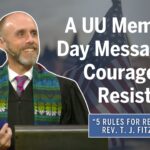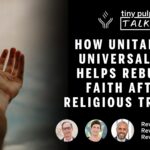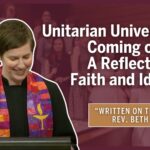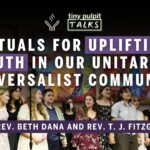A Sermon for Memorial Day | Rev. Dr. Daniel Kanter | 05.26.24

Sermon Transcript
I’m not one for battlefields or visiting them or pacing up and down where men blew each other up. That’s not my thing. The deafening silence of those places doesn’t call me to walk among the once of drumbeaten places of boots and bombshells. There are so many places like that, Antietam and Ardennes and the Alamo, and those are just the places that start with A that I could remember, battlegrounds of old now perhaps museums that tell some stories. But I think memorials to the dead are better. I like graveyards.
I like walking slowly among the stones, some faded with times. The dates and names disappear, but hundreds of years have passed since the bodies are put in the ground because there you can walk through your own memories, memories of the dead, remembering the people who touch your face with their wrinkled hands or reached out for support. Graveyards are like places that are for honor and reverence and peace to me. And they’re even more so when they’re graveyards of those lost on battlegrounds, men and women who sacrificed lives to fight for kings and causes because there you know that they had purpose. They died maybe accidentally or through some random act, but with some badge of honor. Theirs is a story told of individuals who died together.
One of my favorite such places is in Concord Massachusetts, not the Sleepy Hollow cemetery full of our religious ancestors, the Emersons and the Alcotts and the Thurrows, but the graves by the old North Bridge. You remember the story of the shot heard around the world, the Ralph Waldo Emerson coined phrase in the poem to commemorate the beginning of the American Revolution, “By the rude bridge that arched the flood. Their flag to April’s breeze unfurled. Here once the embattled farmers stood and fired the shot heard round the world.” He wrote this and it was sung as a hymn in 1837 on July 4th, telling how the revolution started just yards from his grandparents’ home, now called the Old Manse, a place worth visiting if you are in New England.
But the extraordinary thing about that place is something you could overlook. While entranced by the monument to the farmers who started the revolution, there are to your left down near your knees graves to British soldiers. The monument says, “They came 3,000 miles and died to keep the past upon its throne, unheard beyond the ocean tide their English mother made her moan.” That monument is to the enemy. The acknowledgement is that they too had mothers and fathers and children and families and far from home died in a battle to force this country to keep the king. It is a touching thing to preserve that monument and rare, because we humans like to eradicate our enemies to draw hard lines between us to hold off any emotion or understanding that those on the other side of just about anything would have heart, soul, be loved or love, have a say in their own dignity or have hopes. Am I speaking the truth to you?
This enemy-making, enemy-shoring mindset has not served humanity. It continues to fail us as a human species today. For a long time since we’ve been walking on this globe, we have had both the capacity to collaborate and to see each other clearly and the capacity to demonize and criminalize and determine the failures of others. That is part of the human condition. That is why that British monument is such a tender gesture, decorated tomorrow alongside the many fallen farmers and businessmen and doctors and nurses and chaplains killed in conflicts around the world in our country. Graveyards tomorrow will be full of American flags. And even as we raise ours, someone will refresh those British flags at the old North Bridge in Concord to remind us of something deeper than our patriotism, that the enemy has dignity to.
That is a spiritual reminder to me and maybe to you that even when people like a football kicker stands up and criminally blasts the dignity of all women at his commencement address at Benedictine College in Atkinson, Kansas speaking for the Catholic faith as counter-cultural, two things are going on there. That kicker claimed that the Catholic Church was counter-cultural. And who asks an NFL football kicker to do a commencement service? But even he who dressed down the idea of a woman’s right to agency and dignity, something we believe so strongly here, even as he was doing that, I was thinking through that nicely trimmed beard, he also has dignity. In part I forgave him because I think he’s a tool of a bigger force in our country, enemies and suits and ties who are leading Congress and a charge to defend our country from liberals like us.
That bigger fight at hand is with Christian nationalism. Have you ever heard those terms? Which upholds the belief that the American nation is defined by Christianity and that government should take active steps to keep it that way. Popularly, Christian nationalists assert that America is and must remain a quote “Christian nation,” not merely as an observation about American history, but as a perspective, a prescriptive program for what America must continue to be in the future.
Christian nationalists are advocating for an amendment to the Constitution to recognize America’s Christian heritage as others are working to reinstate prayer in public schools. Some are working to enshrine Christian nationalists, interpretations of American history in our school curricula, including that America has a special relationship with God or has been chosen by him to carry out a special mission on earth.
Christian nationalists are advocating for immigration restrictions specifically to prevent the change in American society around American religious and ethnic demographics. Someone to empower the government to take stronger actions to limit what they see as “immoral behavior.” Do you know what that is?
Christian nationalism is most evident not in its political agenda even, but in its attitude that Christians are entitled to a primacy of place in the public square because they are heirs of the true or essential heritage of American culture. That Christians have a presumptive right to define the meaning of the American experiment because they see themselves as America’s architects, first citizens and guardians.
This is an oppressive system that they are trying to compose in our country, is rising in popularity. And the kicker from the Kansas City Chiefs is only the tip of the iceberg. The problem here is that it creates an idea of a class system in which we, progressives and liberals, are second class at best, and I would put in jeopardy of respect for full religious liberty of all Americans. It seeks to empower the state through what they call moral legislation to regulate conduct and give Christianity a privileged place more than it already has.
Christian nationalism is an ideology that is held also overwhelmingly by white Americans, and thus it tends to have a racial and ethnic bias. Neither is this the kind of sentiment which put those British graves at the North Bridge, nor is it very American. And I know I am using this Memorial Day weekend to point in two directions, but more and more I’m confronted by Christian nationalism as a threat to patriotism and to our very existence for which no markers will be laid in honor after the pitch battles that destroy us, he said rather dramatically.
When I heard that commencement speech… If you don’t know what I’m talking about, just Google Kansas City kicker commencement speech and read down as far as you can keep going because it’s hard. It’s hard. When I heard that speech, what I heard was the demonization of our faith, that we are somehow demons perpetuating a demonic practice in the form of being pro-choice and pro-women in the work that we do. And I’m not talking about this abstractly, one anti-abortion news article called “us” and “me” demonic, terms used by Christian nationalists to demonize. And the reason this is relevant is because these real enemies challenge me and us to ponder a core spiritual commitment that we have in this church, which is to see our common humanity.
The challenge lately is to remain loyal to our faithful response to enemies, which has been and is to see the dignity in all people and to resist the headlong tumble of demonization of them even while being made an enemy ourselves. And in the midst of that, the most important thing is that we don’t begin to demonize each other in the meantime over disagreements and perceptions about things like wars and Gaza and the Ukraine because that divide and conquer strategy is very clearly a strategy of Christian nationalism and will have an impact as we near November.
The good news, the good news is that we’re standing up to this force of Christian nationalism in our country just in declaring loudly who we are and what we will do and keep doing and in joining partners who are fighting this cause. We met recently with local representatives of Christians against Christian nationalism. We were encouraged by this movement, not the least of which because it started in the Baptist Church. And it claims this, and here’s what it’s claiming. It claims that people of all faith and none have the right and responsibility to engage constructively in the public square. That patriotism does not require us to minimize our religious convictions. That one’s religious affiliation or lack thereof should be irrelevant to one standing in civic community. That government should not prefer one religion over another or religion over non-religion.
That religious instruction is best left to our houses of worship. That America’s historic commitment to religious pluralism enables faith communities to live in civic harmony with one another without sacrificing our theological convictions. That conflating religious authority with political authority is idolatrous and often leads to oppression of minority and other marginalized groups as well as the spiritual impoverishment of religion itself. And finally, whether we worship at church, mosque, synagogue or temple, America has no second-class faiths. All are equal under the U.S constitution to which the people said…
And that’s the Baptists talking. Now, the Unitarians and the Baptists are working together. The real challenges here that we face are not just as institutions though. They’re also as people and individuals. To love our neighbors as ourselves is not something we are going to pull back from anytime soon. And at the same time, we will not allow ourselves to become enemies or give into those who want to demonize us. You see what I’m trying to ask you to do? This takes a great effort spiritually. It takes an effort individually to hold that ground, to love your neighbor, but not to be pulled into a bipolar situation as an enemy or to make another an enemy.
Welcome to the inside of my brain every time we get close to these patriotic days, because I know some of you on Monday will adorn graves of soldiers who died, maybe members of your family with a flag. And that is good. You might go for a walk in a graveyard and just ponder your life and theirs, what mission they died for, what freedom they fought for, what kind of patriotism we need. And if you’re going to do that, just remember those British soldiers’ graves that are reminders to us about a core element of our faith.
I think mostly because Concord is full of Unitarians, I have no doubt one of ours put that gravestone there as a challenge to the rest, to see dignity in all, to see neighbor as someone to love, even those who want to destroy our land or the fabric of our bonds, or challenge us to live up to our ideals. The real work here is to hold all this together in what is true. And to remember what the UU minister A. Powell Davies said in our reading, “Loyalty is never an attachment to something external so much it is as it is an allegiance to something inside yourself.”
And to remember the Rabbi in today’s poem who implores her people to hold Gaza and Israel and all its people in the heart of God when she, “Soften this hold on, our exclusive right to pain, to compassion, to justice. May your children,” she says, speaking to God, “all of us unique in your image, come to know the quiet truths of shared pain, shared hope, shared land, shared humanity, shared risk, shared courage, shared peace.” And she finishes her poem in Arabic saying, “Inshallah,” in the name of God. And in Hebrew, “ken yehi ratzon.” May it be your will and may it be ours.
A good Memorial Day weekend to you, friends, enough to ponder your spiritual lives in a world that wants to pull us in so many directions. Amen and amen.







